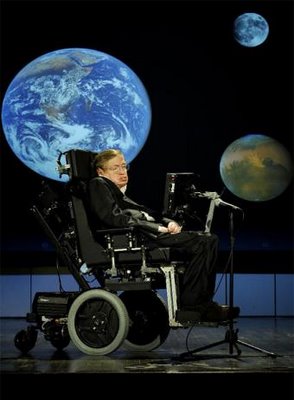My thoughts on quantum gravity
 Last month I read an article about Professor Steven Hawking in which he was quoted as saying:
Last month I read an article about Professor Steven Hawking in which he was quoted as saying:
“I regard the brain as a computer which will stop working when its components fail. There is no heaven or afterlife for broken down computers; that is a fairy story for people afraid of the dark”
Well, that’s nice… As intelligent and qualified as you are to answer questions about black holes and quantum gravity, I’m afraid Professor Hawking, this is a philosophical question. It was for this reason, after reading the article, my Facebook status quickly became:
“Hey Stephen, do want to hear my thoughts on String Theory?”
Professor Hawking has recently been increasingly vocal over the question of God. I was originally going to write a longer post about Professor Hawking’s recent assertions, but then I remembered that Fr. Barron had produced a superb video where he addressed some of these issues:
Rather than simply repeating what Fr. Barron says here, I would just like to address two issues regarding Hawking’s statement quoted above…
“I’m sorry Dave, I can’t let you do that…”
I find it interesting that he regards the brain as being simply a computer. I took an Artificial Intelligence module at University and one of the reasons I enjoyed the subject so much was that it became very philosophical very quickly because it is very difficult to nail down exactly what you mean when you use words like “intelligence” and “understanding”. Some people in the Artificial Intelligence community do indeed regard the brain as being simply a computer. If this were the case, you should be able to produce a computer which is “alive” in the same way we are, but how do you program a machine to become self-aware and capable of understanding in the way that we humans are?

There is a thought experiment called “The Chinese Room” which I think is useful here. We are told to imagine a person inside a locked room. That person only understands English (insert joke here about the Americans or the British…). From time to time, questions written in Chinese are pushed under the door. The English speaker then follows a rulebook found inside the room and, by following the rules, produces another set of Chinese characters which he, in turn, pushes back under the door.

To the Chinese person outside of the room it looks like the person inside is someone who understands Chinese, whereas we know this is not the case. The person inside the room is just manipulating symbols which are meaningless to him, according to a set of rules, in much the same way computer programs manipulate data but without understanding.
We can get computers to mimic human behaviour, sure, but as tempting as it may be, I don’t think one can simply equate the self-aware, conscious, understanding human mind and an X-Box 360…

Judgmental Religion
The other point I would just like to make is that I was surprised as the brash nature of Hawking’s comment, particularly in an era where political correctness is king. He basically compares theists to gullible, foolish, frightened children. I can’t help but wonder, if a religious leader made a comparable comment about those who deny the spiritual, whether it would be decried in the media as “intolerant” and “inflammatory”…
Just a thought.
Sounds like Hawking fell into this one: http://en.wikipedia.org/wiki/False_analogy
Nice entry! You would have enjoyed the Theology on Tap I went to a few weeks ago on combating atheism. The philosophy professor dismissed/ proved Hawking and a few other renowned physicists wrong using accepted scientific theories against their arguments. Unfortunately, I can’t share more since I wasn’t taking notes.
Never heard of the “Chinese room” -that’s cool!
Glad you liked it
I would only expect Computer Science nerds to know about the Chinese Room I loved those kinds of “thought experiments” at University, especially over a beer
I loved those kinds of “thought experiments” at University, especially over a beer 
If you read “Black Holes and Baby Universes and other Essays” by Hawking you find out real quick that, though a brilliant physicist, he’s a terrible theologian. Like so many, he simply got stuck in a “God of the gaps” type scheme and can’t seem to get back out of it. I find it funny (odd, not ha-ha) that some science types can accept that God is outside of His creation, while others get stuck looking for Him inside of it. To use the old “clockmaker” analogy, it’s as though, upon not finding the clockmaker actually sitting there inside his clock, they dismiss him as non-existent.
Search for Brother Guy Consolmagno and you’ll get to read a brilliant astrophysicist turned Jesuit brother. My husband and I both had the pleasure of meeting him when he came and spoke at USD through the dept I worked for at the time, and Bro Guy is as nice as he is amazing.
Nice work, Mr. Bates, I am really enjoying your blog!
Hey Teresa, thank you for the kind words and welcome to Restless Pilgrim!